Peugeot Traveller vs VW ID. Buzz Cargo – Differences & prices compared
Two cars, one duel: Peugeot Traveller meets VW ID. Buzz Cargo.
Which one wins in performance, efficiency and value for money? Find out now!
Costs and Efficiency:
Price and efficiency are key factors when choosing a car – and this is often where the real differences emerge.
Peugeot Traveller has a noticeable advantage in terms of price – it starts at 34800 £, while the VW ID. Buzz Cargo costs 43600 £. That’s a price difference of around 8739 £.
In terms of energy consumption, the advantage goes to the VW ID. Buzz Cargo: with 19.20 kWh per 100 km, it’s evident more efficient than the Peugeot Traveller with 24.30 kWh. That’s a difference of about 5.10 kWh.
As for range, the VW ID. Buzz Cargo performs noticeable better – achieving up to 455 km, about 104 km more than the Peugeot Traveller.
Engine and Performance:
Power, torque and acceleration say a lot about how a car feels on the road. This is where you see which model delivers more driving dynamics.
When it comes to engine power, the VW ID. Buzz Cargo has a decisively edge – offering 340 HP compared to 180 HP. That’s roughly 160 HP more horsepower.
In terms of top speed, the Peugeot Traveller performs a bit better – reaching 185 km/h, while the VW ID. Buzz Cargo tops out at 160 km/h. The difference is around 25 km/h.
There’s also a difference in torque: VW ID. Buzz Cargo pulls decisively stronger with 679 Nm compared to 400 Nm. That’s about 279 Nm difference.
Space and Everyday Use:
Beyond pure performance, interior space and usability matter most in daily life. This is where you see which car is more practical and versatile.
Seats: Peugeot Traveller offers convincingly more seating capacity – 8 vs 3.
In curb weight, Peugeot Traveller is slightly lighter – 1953 kg compared to 2264 kg. The difference is around 311 kg.
In maximum load capacity, the VW ID. Buzz Cargo performs to a small extent better – up to 3900 L, which is about 600 L more than the Peugeot Traveller.
When it comes to payload, Peugeot Traveller a bit takes the win – 914 kg compared to 753 kg. That’s a difference of about 161 kg.
Who comes out on top?
Overall, the VW ID. Buzz Cargo shows itself to be outperforms in nearly all aspects and secures the title of DriveDuel Champion.
It convinces with the more balanced overall package and proves to be the more versatile choice for everyday use.
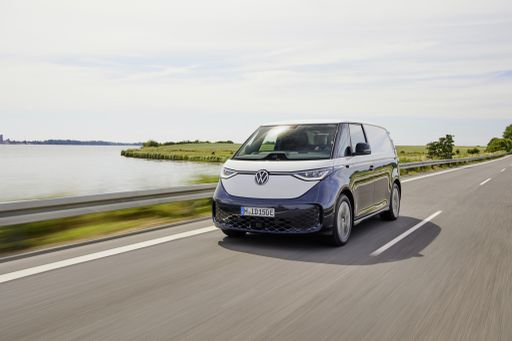
VW ID. Buzz Cargo
Peugeot Traveller
The Traveller captivates with its refined blend of comfort and versatility, making it an ideal choice for both family adventures and professional needs. Its spacious interior accommodates a remarkable range of passenger and cargo configurations, ensuring flexibility for any journey. With an emphasis on safety and modern features, the Traveller delivers a remarkable driving experience that caters to diverse lifestyles.
details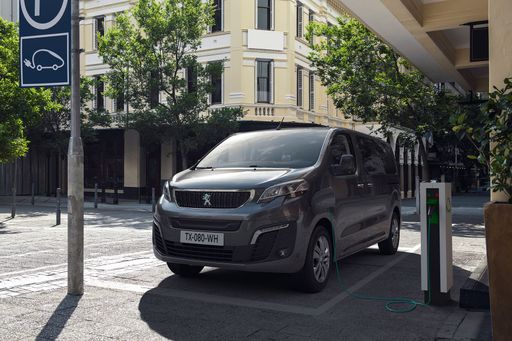 @ media.stellantis.com
@ media.stellantis.com
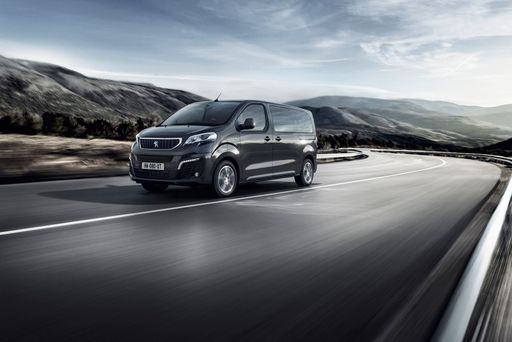 @ media.stellantis.com
@ media.stellantis.com
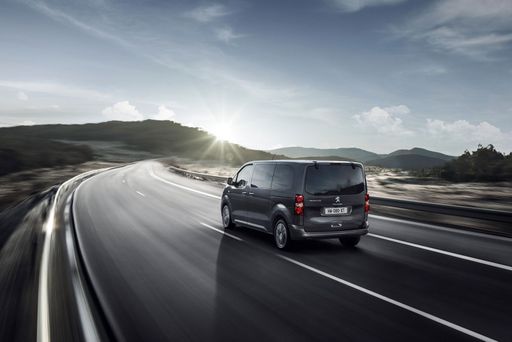 @ media.stellantis.com
@ media.stellantis.com
 @ media.stellantis.com
@ media.stellantis.com
VW ID. Buzz Cargo
The VW ID. Buzz Transporter represents a bold leap into the future with its innovative electric design and retro-inspired aesthetic. Combining practicality with modern technology, it offers a spacious interior and advanced connectivity features ideal for both urban and long-distance journeys. This vehicle stands as a testament to Volkswagen's commitment to sustainability and forward-thinking mobility solutions.
details @ volkswagen-newsroom.com
@ volkswagen-newsroom.com
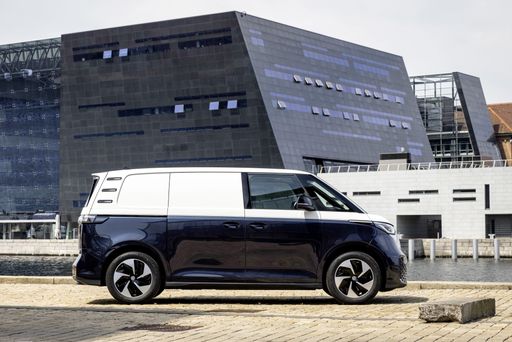 @ volkswagen-newsroom.com
@ volkswagen-newsroom.com
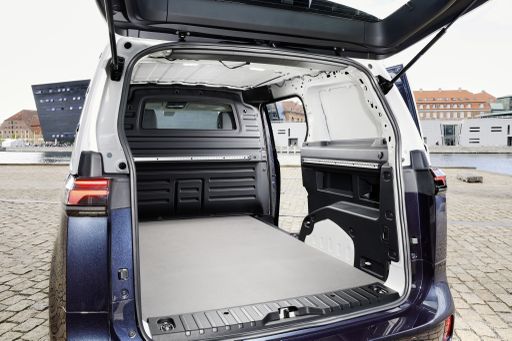 @ volkswagen-newsroom.com
@ volkswagen-newsroom.com

|

|
|
|
|
Costs and Consumption |
|
|---|---|
|
Price
34800 - 52200 £
|
Price
43600 - 51400 £
|
|
Consumption L/100km
7 - 7.1 L
|
Consumption L/100km
-
|
|
Consumption kWh/100km
24.3 - 25 kWh
|
Consumption kWh/100km
19.2 - 20.3 kWh
|
|
Electric Range
217 - 351 km
|
Electric Range
330 - 455 km
|
|
Battery Capacity
-
|
Battery Capacity
59 - 79 kWh
|
|
co2
0 - 188 g/km
|
co2
0 g/km
|
|
Fuel tank capacity
70 L
|
Fuel tank capacity
-
|
Dimensions and Body |
|
|---|---|
|
Body Type
Bus
|
Body Type
Cargo Van
|
|
Seats
8
|
Seats
3
|
|
Doors
5
|
Doors
4
|
|
Curb weight
1953 - 2240 kg
|
Curb weight
2264 - 2510 kg
|
|
Trunk capacity
1624 - 2011 L
|
Trunk capacity
-
|
|
Length
4983 - 5333 mm
|
Length
4712 mm
|
|
Width
1920 mm
|
Width
1985 mm
|
|
Height
1890 mm
|
Height
1932 mm
|
|
Max trunk capacity
2700 - 3300 L
|
Max trunk capacity
3900 L
|
|
Payload
850 - 914 kg
|
Payload
640 - 753 kg
|
Engine and Performance |
|
|---|---|
|
Engine Type
Electric, Diesel
|
Engine Type
Electric
|
|
Transmission
Automatic
|
Transmission
Automatic
|
|
Transmission Detail
Reduction Gearbox, Automatic Gearbox
|
Transmission Detail
-
|
|
Drive Type
Front-Wheel Drive
|
Drive Type
Rear-Wheel Drive, All-Wheel Drive
|
|
Power HP
136 - 180 HP
|
Power HP
170 - 340 HP
|
|
Acceleration 0-100km/h
10.6 - 14.2 s
|
Acceleration 0-100km/h
-
|
|
Max Speed
130 - 185 km/h
|
Max Speed
145 - 160 km/h
|
|
Torque
270 - 400 Nm
|
Torque
310 - 679 Nm
|
|
Number of Cylinders
4
|
Number of Cylinders
-
|
|
Power kW
100 - 132 kW
|
Power kW
125 - 250 kW
|
|
Engine capacity
2184 cm3
|
Engine capacity
-
|
General |
|
|---|---|
|
Model Year
2024 - 2025
|
Model Year
2024
|
|
CO2 Efficiency Class
A, G
|
CO2 Efficiency Class
A
|
|
Brand
Peugeot
|
Brand
VW
|
What drivetrain options does the Peugeot Traveller have?
Available configurations include Front-Wheel Drive.
The prices and data displayed are estimates based on German list prices and may vary by country. This information is not legally binding.
